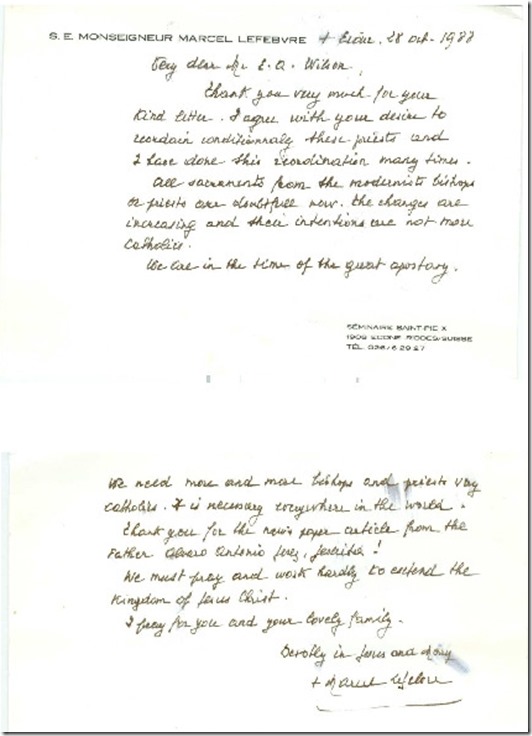Questionable priestly ordinations in the conciliar Church
— A letter of Archbishop Lefebvre:
[ Editor’s note: In this transcription, we have left unchanged the spelling and style found in the handwritten letter of the Archbishop. ]
Ecône, 28 oct. 1988
Very dear Mr. Wilson,
thank you very much for your kind letter. I agree with your desire to reordain conditionnaly these priests, and I have done this reordination many times.
All sacraments from the modernists bishops or priests are doubtfull now. The changes are increasing and their intentions are no more catholics.
We are in the time of great apostasy.
We need more and more bishops and priests very catholics. It is necessary everywhere in the world.
Thank you for the newspaper article from the Father Alvaro Antonio Perez Jesuit!
We must pray and work hardly to extend the kingdom of Jesus-Christ.
I pray for you and your lovely family.
Devotly in Jesus and Mary.
Marcel Lefebvre
Commentary
Archbishop Lefebvre relies on two principal arguments to assert that the new sacraments, especially ordinations, are henceforth questionable:
* the evolution of the rites;
* and the defect in intention.
The new rites of the sacraments promulgated by the conciliar Church, promulgated in the typical editions in Latin, are probably valid 1. But that does not prevent numerous sacraments from being invalid in practice, for the two reasons quoted above.
Archbishop Lefebvre said that in his opinion a great number of new masses were invalid – while admitting the validity of the new rite in itself.
Bp Tissier de Mallerais, in his sermon from June 29, 2016 at Econe, spoke as follows concerning the rite of ordination for priests:
“Clearly, we cannot accept this faked new rite of ordination that leaves doubts concerning the validity of numerous ordinations done according to the new rite. Thus this new rite of ordination is not Catholic. And so we will of course faithfully continue to transmit the real and valid priesthood by the traditional priestly rite of ordination.”
In an article that appeared in Le Sel de la terre 54 on the subject of the validity of the new rite of episcopal consecration, after showing that the rite in itself is probably valid, we added:
“Due to the generalized disorder, both at the liturgical and dogmatic levels, we can have serious reasons to doubt the validity of certain episcopal ordinations.”
And we quoted the remarks of Archbishop Lefebvre on the subject of the episcopal consecration of Bp Daneels, auxiliary bishop of Brussels:
“Little booklets were published on the occasion of this consecration. For the public prayers, here is what was said and repeated by the crowd:
Apostle like Luther, but what intention did the bishops have when they consecrated this bishop, Bp. Daneels2?”
“It is frightening…Was this bishop really consecrated? We can doubt it anyway. And if that is the intention of the consecrators, it is incomprehensible! The situation is even more serious than we thought3.”
We could quote numerous examples of sacraments given in the conciliar Church that were certainly invalid: confirmations given without using holy oils; baptisms where one person pours the water, while another pronounces the words, etc4.
This is why the position of Archbishop Lefebvre in the letter that we have quoted here, appears wise: because of the particular importance of the sacrament of ordination, it is necessary to conditionally re-ordain the priests who come from the conciliar Church to the Traditional one.
(Taken from “Le Sel de la terre” 98)
- We can make an exception for the new rite of Confirmation that permits the use of oils other than olive oil, which introduces a doubt concerning the validity, by reason of a defect of matter. We also point out that Fr Alvaro Calderon (SSPX), in the Spanish language review Si Si No No (#267, November 2014), speaks of a “slight doubt,” a “shadow” concerning the validity of the new rite of episcopal consecration in itself (see Le Sel de la terre 92, p. 172).
- Archbishop Lefebvre, Conference in Nantes (France), February 5, 1983.
- Archbishop Lefebvre, Conference in Ecône (Switzerland), October 28, 1988.
- We take this occasion to ask our readers who have knowledge of sacraments that are certainly invalid (notably baptism) to kindly send us their testimony.

